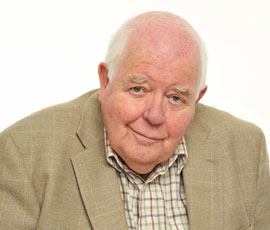OPINION: We’re not the Kiwis, says David Richardson

We already know the EU budget will be smaller in future, which implies smaller single farm payments and perhaps reduced environment-based aid.
But the prospect of a referendum on Britain’s membership of the Union could lead to it leaving Europe and, if Owen Paterson is still secretary of state at DEFRA and still clinging to his declared objectives, to the end of farm subsidies altogether.
I’m not saying it will happen – just that it might. So, I was pleased to be part of a debate recently that speculated on what UK farmers might do, given such a change of policy. It was led by a New Zealander who had been around when, in 1984, then-New Zealand prime minister David Longe decided three million New Zealanders could no longer afford to subsidise 70 million sheep.
Like most of his countrymen, our New Zealander was enthusiastic about the benefits his country has enjoyed since it went cold turkey and abolished subsidies. He explained agriculture represented 15% of New Zealand’s GDP, employed 16% of its population directly, while a further 30% worked in the food industry. There can’t be many countries where farming is more important to the economy.
As our antipodean friend said, prior to 1984 his country had been like “fortress New Zealand”. Virtually everything to do with farming was subsidised; including production of all kinds, interest rates, fertilisers and so on. And it was draining the country’s economy. It all ended at a stroke. At the same time, most regulations were abolished, the New Zealand dollar was floated and farmers who were the most heavily in debt had loans rescheduled to spread repayment or forgiven.
The economy was slow to respond as the industry adjusted. Land prices fell for five years before stabilising and have been rising since. The national sheep flock fell to today’s level of 20 million. Dairy cattle numbers fell, too, by a smaller percentage. Systems of livestock management such as “easy-care” were adopted – in other words, virtually no care and likely be called neglect in Europe. Diversification into new enterprises like angora goats and kiwi fruit flourished – some briefly before fading again and some more successfully.
But the climate is crucial. In New Zealand grass grows all year. There’s no need for expensive livestock housing or to preserve winter feed. In arable areas the microclimate is very helpful. It’s no coincidence the world record wheat yield is held by a New Zealand farmer. Add that to the lack of regulations, and you have an industry that can compete on favourable terms with any country.
Our New Zealander suggested we could be faced with a situation similar to that he had experienced since 1984. And we could be forced to react in similar ways. Some of those present believed higher commodity prices would help them survive, as would proximity to half a billion consumers across Europe. I was less sanguine.
Firstly, we don’t and will never benefit from the climatic advantages enjoyed in New Zealand. Secondly, I cannot imagine the British or European governments kicking regulations into touch or forgiving farmers’ debt. Thirdly, food security is becoming more important every year and I’m convinced our government will want to keep its hands on what it sees as the levers of production. Whether they understand how to manipulate those levers is another matter.
David Richardson farms about 400ha (1000 acres) of arable land near Norwich in Norfolk in partnership with his wife, Lorna. His son, Rob, is farm manager.
Read more from all our Opinion writers
